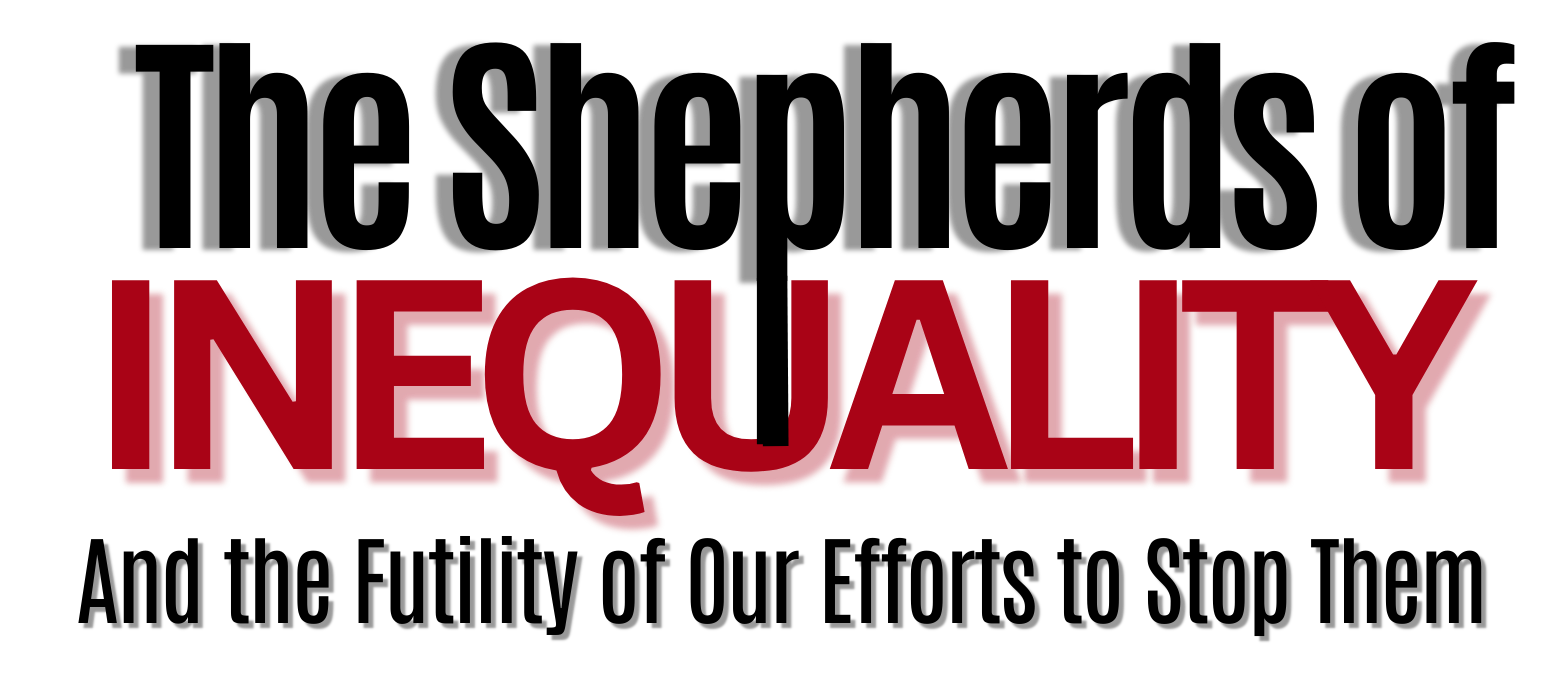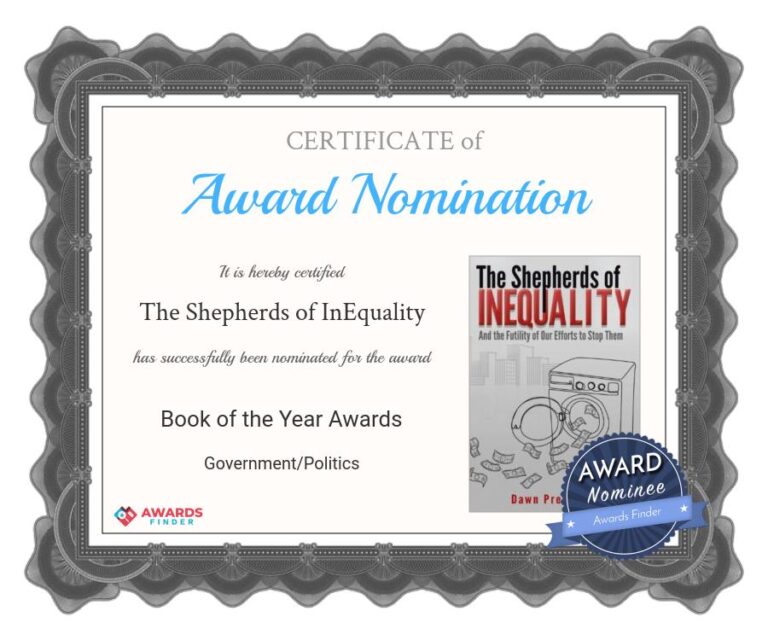
The book is making waves, but Dawn is passionate about making a real change in society – this change can only be achieved together!
Here are some of the accolades and reviews:
Reviews:
The panel was very impressed with your manuscript. ‘Worldwide in its scope. This work takes complex themes and explains them in a fastidious and attainable manner.’ Your award is very well deserved.
Andy Oakes – The Writers Forum
It’s no secret that income inequality is a hot-button issue. But for all the ink spilled on the have’s and have-not’s, few seem aware of the secret industry at the heart of the imbalance: international money laundering. In The Shepherds of Inequality, author Dawn Pretorius sheds light on this shadowy network, exposing how the criminally wealthy exploit the darker side of finance. Through detailed research, she shows the ways these practices have proliferated, and outlines the failures of legislation to combat them. Her message is an urgent warning and a hopeful plea, one world leaders should heed…before it’s too late.
One of the biggest hurdles which has always existed in our world and in every culture and society has been a sense of inequality. Inevitably there rises a group of people with more money, more power, and what is considered a higher status of living within an organized society which determines a person’s place in the upper class, while others are relegated to a lower class of citizen due to a lack of money, resources, or power. This inequality also allows for those in power to seek more money and more power through criminal enterprises, and the fight to stop these criminal acts and the money laundering that it fuels is an uphill battle for lawmakers and law enforcement.
In author Dawn Pretorius’s The Shepherds of Inequality: And the Futility of Our Efforts to Stop Them, the author uses expert research and findings to showcase the knowledge of money-laundering cases between 2017 and 2022. These cases include everything from trafficking people, donkeys and sand, to those in power or wealth taking part of one of the world’s biggest and most lucrative shady businesses, and the author also manages to trace the origin of anti-money-laundering legislation and what actions or initiatives are being taken to combat the crimes being committed. This ultimately leads the author to discover a series of bureaucratic compliance initiatives that cost banks a lot of money and yet have very little effect in the long run. Through the author’s findings, it is discovered the reasons behind this course are a result of tax application, offshore tax havens, a culture of greed and so much more, which have led to a global inequality and undernourished economies.
The author did a wonderful job of providing both a clear and concise report on the facts of these cases and the work in anti-money-laundering as a whole, as well as an air of intrigue and shocking revelations behind some of the world’s most hidden and chilling criminal enterprises. The balance of financial and business knowledge mixed with the criminal justice system overall was greatly felt, and the way the author was able to incorporate several different cases over the span of the entire globe was a big help in revealing just how far reaching the criminal networks and the system is. The themes focused greatly on how this anti-money-laundering system allowed inconsistencies to flourish as regulatory changes are introduced not all at once, but in different times depending on where you are in the world, and this was just the first example given.
This is the perfect read for those who enjoy non-fiction books, especially those who enjoy non-fiction books surrounding criminal law, business, and finances as a whole. The way the author is able to weave all three of these genres together so naturally and captivate readers with the shocking realities of these crimes was amazing. What really struck me was the way the author honed in on the systems which allow these criminal networks to thrive and grow in this day and age, from poor economic conditions in some countries to systems of inequality among people that create desperation, overwhelming stress, and a survival instinct in some people to do whatever it takes to make ends meet and live in this world, even if it means turning to these horrible industries.
Captivating, thought-provoking, and engaging, author Dawn Pretorius’s The Shepherds of Inequality: And the Futility of Our Efforts to Stop Them is a must-read non-fiction book that hones in on the ways the inequality in our society creates a breeding ground of criminal enterprises to rise and thrive in the world, and gives those in power the means to expand their reach. The mystery and intrigue that criminal enterprises bring out in people who are interested in non-fiction crime stories blend well with the straightforward, fact-driven narrative the author displays in this powerful book.
Pacific Book Review
In The Shepherds of Inequality, Dawn Pretorius declares money laundering “one of the world’s biggest and most vociferous sustainable industries.”
Defining dirty cash as profits from drug dealing, people trafficking, arms smuggling, illegal logging and mining operations, as well as tax evasion, insider trading, embezzlement, cybercrimes, identity theft and other “white-collar” shenanigans, Pretorius presents 60 months of “randomly” selected news stories from 50 “equally randomly chosen” countries as proof of the perniciousness of this crime. Her examples run the gamut from no-brainer schemes – like using fake invoices and inflating prices – to mind-boggling scenarios, such as Iran’s alleged laundering of $20 billion in oil and gas revenues (despite U.S. sanctions) through a Turkish bank under the guise of gold and food commodity sales.
There’s also a fascinating chapter on cryptocurrency laundering (which includes the 2019 attack on Japan’s BITPoint exchange where investors lost $28 million), and a detailed discussion of the Financial Action Task Force (FATF), set up by the G7 in 1989. The author notes that FATF policies to combat money laundering, while not hindering criminals, have burdened banks with the task of alerting authorities to potential crime. Pretorius goes carefully through the evolving regulations and the corners that bankers cut to avoid them. (Readers might ironically note that savvy money launderers could learn a few tips here.)
Oddly, this insider-like analysis seems disproportionate to the broad, liberal thesis: “Inequality is almost always the result of laundered money,” which gets a more general treatment. It’s missing the granular detail offered elsewhere. However, this playbook offers valuable insights on “dirty” cash flow.
Also available in hardcover and ebook.
blueink Review










